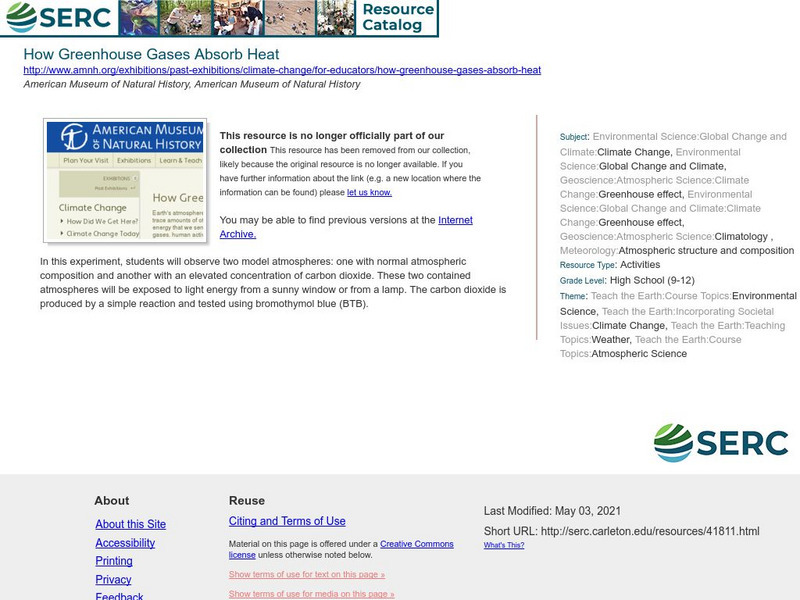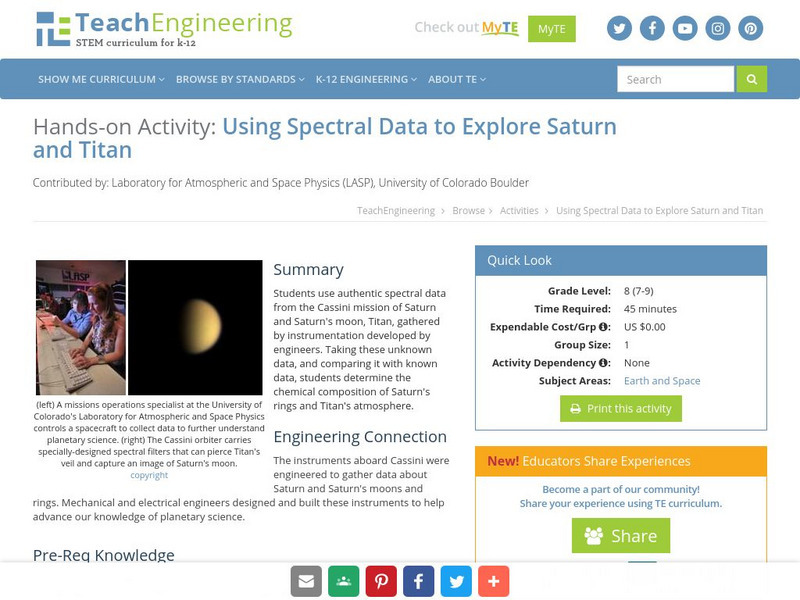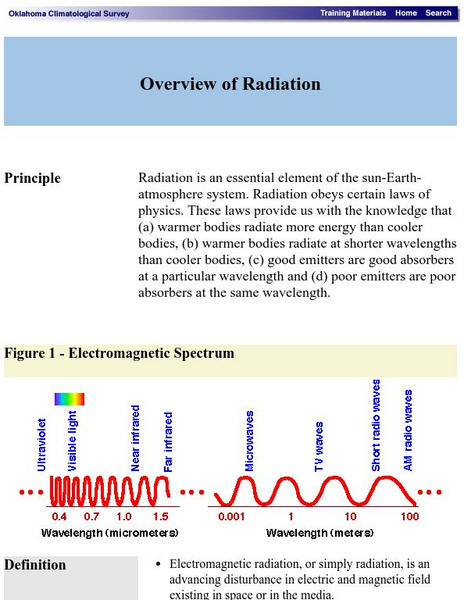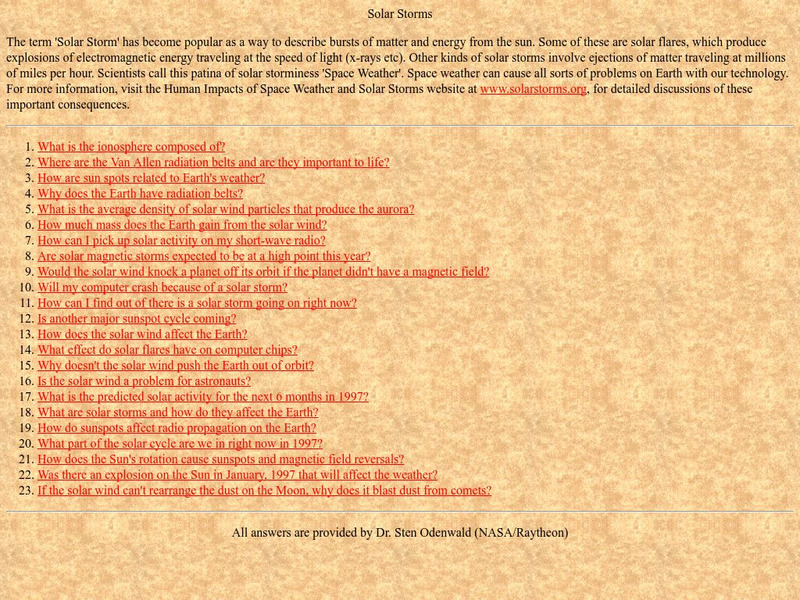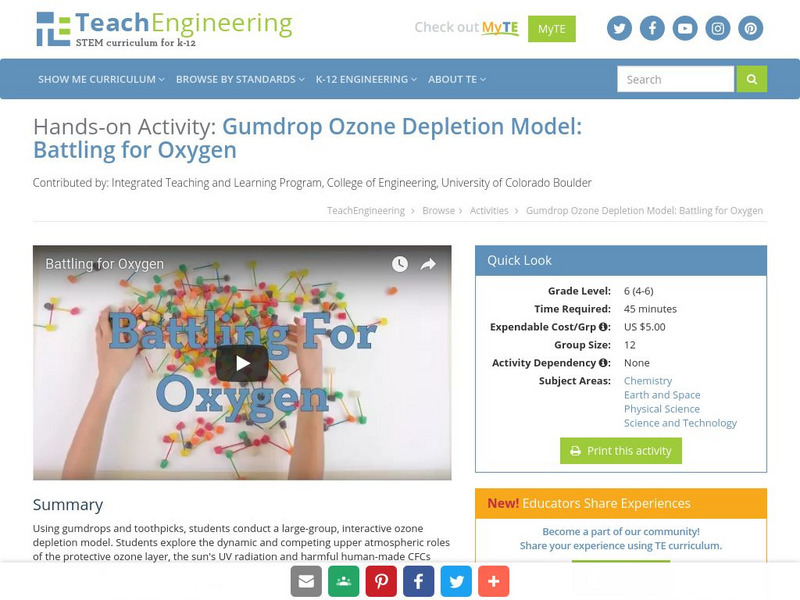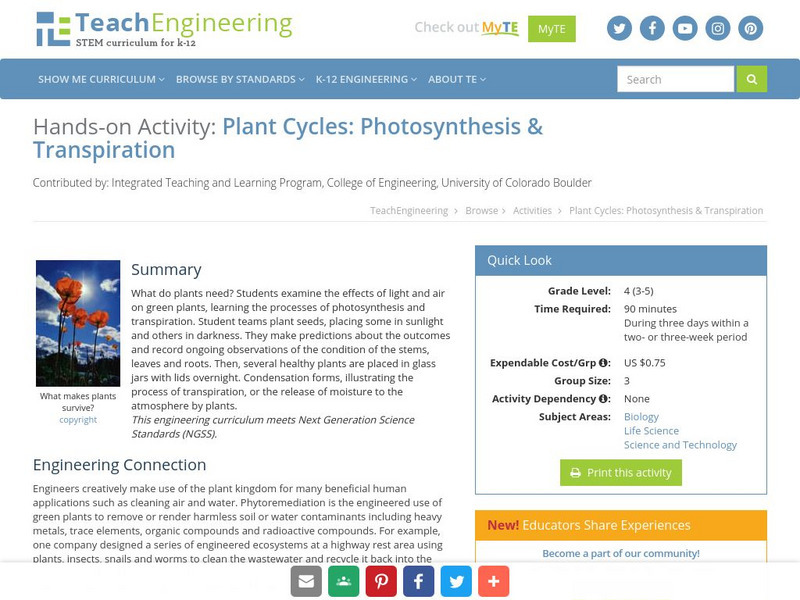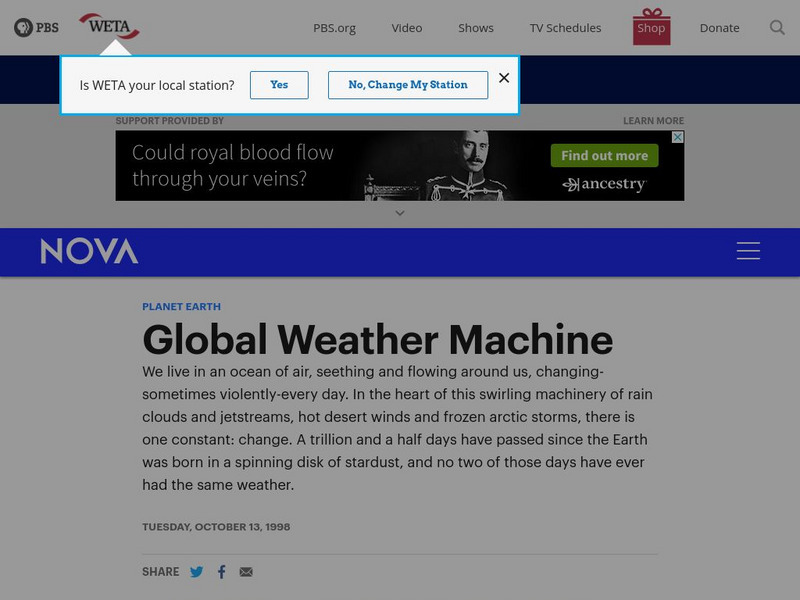Science Education Resource Center at Carleton College
Serc: How Greenhouse Gases Absorb Heat
For this experiment learners observe two model atmospheres: one with normal atmospheric composition and another with an elevated concentration of CO2. These two contained atmospheres will be exposed to light energy in a sunny window or...
Globe
The Globe Program: Air Quality Module
In this storybook, the GLOBE Kids investigate colors in the sky and learn how air pollution affects sky color and our health. Learning activities engage students in describing sky color and conditions in the atmosphere, creating a model...
National High Magnetic Field Laboratory
Magnet Academy: Anders Celsius
Anders Celsius is most familiar as the inventor of the temperature scale that bears his name. The Swedish astronomer, however, also is notable as the first person to make a connection between the radiant atmospheric phenomenon known as...
Government of Alberta
Alberta Environment: Focus on the Ozone Layer [Pdf]
This article explains what the ozone layer is, why it is important, and how we can help to slow down its depletion from the atmosphere.
Other
Gorp: Using Clouds to Forecast the Weather
This resource provides information on the four main types of clouds that form in the atmosphere. There are high clouds, middle clouds, low clouds and clouds with vertical development.
PBS
Pbs Learning Media: What Causes the Gulf Stream?
This video segment adapted from NOVA uses satellite imagery to illustrate the Gulf Stream's path and animations to explain how atmospheric phenomena cause it to move. [1:51]
University Corporation for Atmospheric Research
Ucar: Wind
Wind is air moving from a place that has higher pressure to one that has lower pressure. Sometimes wind is just a light breeze and other times it is strong enough to blow the roofs off buildings.
University Corporation for Atmospheric Research
Ucar: Plasma
Article explores plasma, an electrically charged gas found in electrical lights and nature.
Texas Instruments
Texas Instruments: Sunrise, Sunset: Weather Match
Students determine the relationship between temperature and light intensity. They use a Temperature Sensor and a Light Intensity Sensor to collect temperature and light intensity data for a period of 24 hours. They understand the effect...
TeachEngineering
Teach Engineering: Using Spectral Data to Explore Saturn and Titan
Students use authentic spectral data from the Cassini mission of Saturn and Saturn's moon, Titan, gathered by instrumentation developed by engineers. Taking these unknown data, and comparing it with known data, students determine the...
Oklahoma Mesonet
Oklahoma Climatological Survey: Overview of Radiation
This site details what radiation is, the physics of radiation, and radiative transfer as it occurs in nature. Content explores the electromagnetic spectrum, electromagnetic waves, properties of radiation, and solar radiation.
BioEd Online
Bio Ed Online: Finding the Carbon in Sugar
Students learn that fossil fuels release energy when they are burned, and this takes the forms of light, heat, gases, etc. For this lesson they explore combustion with a candle and with sugar. The lesson and accompanying PowerPoint can...
NASA
Nasa: Image Science Center: Ask the Space Scientist Earth
Site from NASA contains a collection of 91 questions pertaining to the Earth's atmosphere, magnetic field, ionosphere, rotation and origin of life.
PBS
Nh Pbs: Nature Works: Ecosystems
How would you define an ecosystem? Check out this educational resource to learn more about the living and nonliving parts of different ecosystems.
Lawrence Berkeley National Laboratory
Berkeley Lab: University of California: Electromagnetic Radiation
This page defines electromagnetic radiation. Included are links to more information.
University of Colorado
University of Colorado: Ph Et Interactive Simulations: The Greenhouse Effect
How do greenhouse gases affect the climate? Explore the atmosphere during the ice age and today. What happens when you add clouds? Change the greenhouse gas concentration and see how the temperature changes. Then compare to the effect of...
TeachEngineering
Teach Engineering: Battling for Oxygen
Using gumdrops and toothpicks, students conduct a large-group, interactive ozone depletion model. Students explore the dynamic and competing upper atmospheric roles of the protective ozone layer, the sun's UV radiation and harmful...
TeachEngineering
Teach Engineering: Plant Cycles: Photosynthesis & Transpiration
What do plants need? Students examine the effects of light and air on green plants, learning the processes of photosynthesis and transpiration. Student teams plant seeds, placing some in sunlight and others in darkness. They make...
PBS
Pbs Learning Media: Global Weather Machine
In this illustrated essay from NOVA Online, explore the cyclical process of weather creation and the effects of El Nino on the global weather system.
Other
Back From the Brink: Lessons Learned From Saving the Ozone Layer [Pdf]
Good site for material on the people involved in inventing CFCs and those who discovered its effects on the ozone layer.
Science Education Resource Center at Carleton College
Serc: Analyzing Greenhouse Gases and Global Temperature Data Over Time
In this activity, students plot data on the concentrations of various greenhouse gases in Earth's atmosphere and look for trends. They will learn that greenhouse gases allow the Sun's light to pass through them to the surface of Earth,...
Other
Weather Photography
Source of information on the subject of weather photography. There are great links, images and tips on equipment to use. For the intermediate to advanced photographer.
Exploratorium
Exploratorium: Auroras Paintings in the Sky
This site offers a very nice, detailed explanation of auroras along with some inspiring images and videos.
Environmental Education for Kids
Eek!: Hole in the Ozone Layer
Site creatively explains the causes and effects of ozone depletion. Then asks the question. Is there a hole? Grades 3-6.
